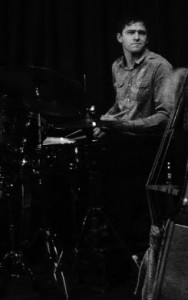 To help shine a light on the lives of working musicians, I’ve been interviewing peers of mine about their experiences performing, how they balance their lives to make the music happen, and if they see a difference between playing for art’s sake or as a job.
To help shine a light on the lives of working musicians, I’ve been interviewing peers of mine about their experiences performing, how they balance their lives to make the music happen, and if they see a difference between playing for art’s sake or as a job.
For this second article I talked to drummer Max Goldman who is not only an incredible player and a great guy, but does a fantastic job balancing playing gigs for money while being relentless about following his artistic path.
Ben Shaw: How long have you been a full time musician?
Max Goldman: Since a little bit after I finished school, around 2007. I was in Brooklyn, practicing a lot during the morning, working some job, then coming home to work on music at night, when Vinny Spirazza, a great New York drummer who was very kind and encouraging to me, had a club date that he was getting tired of and knew I was looking to make a living playing. I was in that club band for years, up until the recession hit and I got fired for going on tour.
Ever since then I’ve been doing a mixture of playing, touring, teaching, with a few jobs mixed in when times get tough.
BS: On a typical week, how often are you playing out and with how many different ensembles?
MG: I usually play a few times during the week, and teach three days a week, plus I have young son so balancing in family time is super important. I’m not sure exactly how many ensembles I play with, they’re normally a lot of different amalgamations of musicians that I end up playing with.
I also still go down to NYC for rehearsals and gigs — May 13th I’ll be there to play at Mezzrow, the sister club of Smalls. Normally I try to go once a month, so I’m not gone too much.
BS: Do you supplement your income in ways other than live performance?
MG: The main way is teaching. Every musician I knew in New York who was active was doing some teaching, so it was always part of the life. I’ve sat in on a few recordings for like a Degree commercial or a Fischer Price ad, but I’ve never been what you’d consider a session musician, more of a bonus than something I ever relied on.
BS: Is it hard to balance playing gigs for a paycheck while also playing shows with a focus on the art? Do you not differentiate between them?
MG: I differentiate a bit but I’ll play any gig because I can always learn something. If it’s a restaurant or a similar situation there’s always something I can be working on like my time, or the feel, or different styles, etc. If I’m on an artistic gig I’ll work on trying to really focus in on interacting with the musicians, create a musical dialogue. I always try my best and can get something out of all of them.
It’d be awesome if I were only playing art gigs every night and could make money doing that but that’s just not feasible. Some people just don’t have it in themselves to play something they don’t fully believe in, but I personally can’t turn down work like that. Even if it’s only something I only sort of enjoy, I’ve known people who go to work hating their jobs everyday, so I keep that in mind.
BS: How has life as a full time musician lived up to your expectations and how is it different?
MG: I never had a complete vision of what my life would look like, I was mostly focused on wanting to play a certain way and have confidence on the instrument. There were these moments where I’d see my teachers and their mastery, and that’s what I would focus on. I wasn’t really thinking about what my livelihood or day to day would look like. I’ve been fortunate to do a lot of traveling, go overseas, see the US, meet amazing people, play music all over the place, and learn so much. There’s been so much that I’ve been very grateful for that I don’t know if I was ever really expecting.
BS: What should people looking to get into a music career know?
MG: My teacher, Tony Moreno, said to me once if there’s something else you love to do, then do that because this is really hard. If you work really hard, things will happen, and although you might have to have other jobs and are going to have to hustle, if you love this you’ll figure it out.
BS: Lastly, what do you wish people knew when they see live music?
MG: Just that the energy they give to the performers has a really big impact. When musicians feel like people are engaged with what’s happening, it really ups the performance and gets the musicians playing better. But it’s a two way street. The musicians have a responsibility to be prepared so that they can give a compelling performance and draw people in, and the audience has to be open to listen to and engage with the music.
For more information on Max visit maxgoldmanmusic.com and for an unabridged version of this interview, please visit isthisjazz.tumblr.com.
Ben Shaw is a local composer, performer, and writer. Find him at benjaminshawmusic.com.


